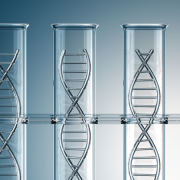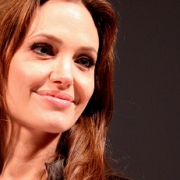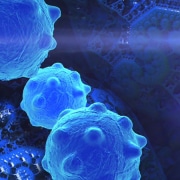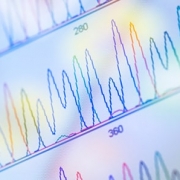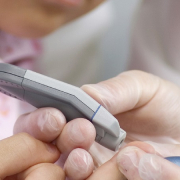Day in the life: consultant in clinical genetics
In this third piece in our series looking at genomics careers, Dr Andrew Douglas describes a profession at the cutting edge of healthcare
Clinical geneticists are medical doctors specialising in the assessment, diagnosis and management of individuals and families affected by genetic disorders. The scope of our referrals covers the entire life course: from in utero life through to old age. Genetic conditions affect all walks of life and all manner of organ systems throughout the body.
Preparation is key
A key feature of clinical genetics is the degree of preparation undertaken prior to clinic in gathering relevant information. This includes taking a full family history, which is vital since a detailed pedigree not only helps interpret the inheritance pattern of disease but also helps determine if a referred patient is in fact part of a wider family already known to genetics.
Another important part of pre-clinic work is to obtain relevant genetic and other results to help guide diagnosis and management. This is crucial for genetics services since they cover large areas of the population spanning multiple NHS trusts, and because it often transpires that a patient’s relative has had genetic testing elsewhere (sometimes abroad).
Test results: one size doesn’t fit all
The results from genetic and genomic tests come in four ‘flavours’. First there are ‘entirely expected’ results, usually where you know exactly what genetic variation you are looking for and the patient either has or hasn’t got it. Second are ‘somewhat expected’ results, for example where you test a panel of genes linked to a disorder such as cardiomyopathy but you don’t know which of those genes (if any) will yield an answer. Then there are ‘somewhat expected but potentially surprising’ results, for example when you use exome or genome sequencing to test a child with non-specific developmental delay where the responsible gene could be any one of several hundred possibilities. Finally, there are ‘completely unexpected’ results, for example the incidental finding of a cancer predisposition gene mutation in a child who has had genome sequencing to investigate developmental delay.
For each type of potential result, fundamentally different pre-test genetic counselling is required – to ensure the patient understands the implications of the test for them and their family. For us as clinical geneticists, it is essential to understand what each type of genetic test can and can’t tell you in order to ensure that appropriate care is provided.
Highly specialised generalists
No two genetics clinics are ever the same. In one clinic I might see, for example: a child with a novel chromosomal duplication of uncertain significance; a woman in her 40s with a family history of dilated cardiomyopathy; and a couple whose previous pregnancy was terminated due to congenital malformations. In the next clinic I could see: a young woman considering predictive testing for Huntington disease; a toddler with a cone-rod dystrophy, cleft palate and dysmorphic features; and an elderly gentleman with a family history of cerebellar ataxia.
The varied caseload of clinical geneticists requires us to work as highly specialised generalists. As there are over 7,000 known genetic conditions and more being discovered all the time, we must also study the latest medical literature on our patients’ varied conditions to provide accurate, up-to-date advice.
Coming together for patient care
Key to our work as clinical geneticists is collaboration with others. We have regular multidisciplinary team (MDT) meetings with those from other specialties such as neurology, cardiology, fetal medicine and orthopaedics to discuss complex cases. This provides an opportunity for our colleagues to obtain specialist genetic advice about what testing is most appropriate for their patients and whether any syndromic diagnoses can be considered. Likewise, we also benefit from their specialist advice for our patients. Clinical genetics services also have a very close working relationship with genetics laboratories. We are in daily contact with our clinical scientist laboratory colleagues, not only to request tests and receive results but also to discuss complex results that require further clarification. This close working relationship is what allows genetics services to be dynamic and responsive to the needs of our patients.
The future: ‘genomic pathology’ and beyond
Clinical genetics has always been a highly academic specialty, contributing to the discovery of a great many of the known disease-causing genes and their molecular pathways as well as helping delineate the basis of many chromosomal disorders. Research studies remain a key part of clinical genetics practice and indeed the specialty has been fundamental in facilitating the success of large-scale sequencing projects such as the Deciphering Developmental Disorders (DDD) study and the 100,000 Genomes Project.
The increasing availability of patient genomic data has required us to upskill in bioinformatics and variant interpretation. Clinical knowledge and experience are essential for the accurate interpretation of genomic information, particularly where a variant’s pathogenicity is not clear-cut. Our role is therefore evolving to encompass not only our existing clinical skills in examining, phenotyping, diagnosing and counselling patients but also new skills more akin to that of a ‘genomic pathologist’: interpreting what we see in a patient’s genomic data in light of clinical information.
Looking forward, there are exciting opportunities for clinical geneticists to be involved in the rapidly growing area of genome-based therapeutics, and in personalised medicine. Such is life in clinical genetics – a dynamic and growing specialty with ever-increasing relevance to mainstream medicine.
Andrew Douglas is a consultant in clinical genetics for Wessex Clinical Genetics Service
‘Day in the life’ is a series of articles commissioned by the GEP with a focus on the healthcare careers being shaped by rapid advances in genomics. Other articles in the series have been written by a trainee genetic counsellor and a genetic diabetes nurse.
–




